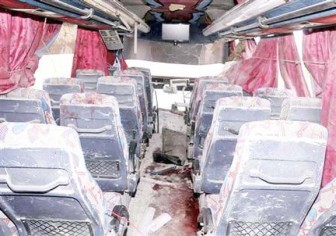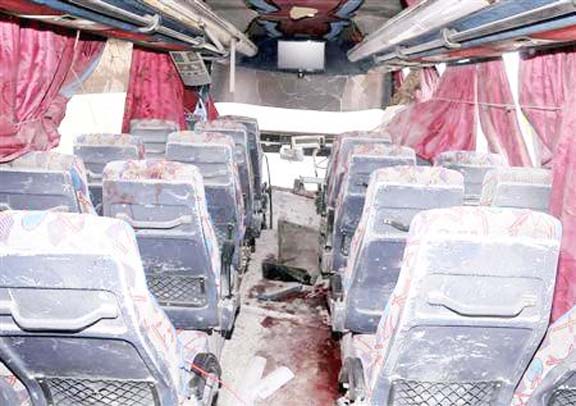BEIRUT, (Reuters) – Syrian troops held their fire yesterday after a U.N.-backed ceasefire deadline passed, giving respite to rebellious towns that have suffered heavy bombardments, but international envoy Kofi Annan pressed Damascus to pull its forces back entirely.

“Syria is apparently experiencing a rare moment of calm on the ground,” Annan said in a statement as he briefed a United Nations Security Council which has been divided along Cold War lines by the 13-month crisis at the heart of the Middle East.
Western leaders, who share Syrian dissidents’ doubts about President Bashar al-Assad’s willingness to end his family’s four decades of absolute power, urged Russia and China, veto-wielding bulwarks for Syria in the Security Council, to push for the inter-Syrian negotiations envisaged by Annan’s peace plan.
“Assad will have to go and the Syrian people must be given the chance to chart their own future,” U.S. Secretary of State Hillary Clinton said. “Given the Assad regime’s record of broken promises, we are proceeding, understandably, with caution.”
Echoing reports from weary opposition activists in some of the most battered districts of Homs, Hama and Idlib, Annan said: “The cessation of hostilities appears to be holding … This is bringing much-needed relief and hope to the Syrian people who have suffered so much for so long in this brutal conflict.”
But he urged the Security Council to demand a full military withdrawal to bolster the extremely fragile truce, part of his six-point plan which also calls for dialogue between the government and opposition aimed at a “political transition”.
Syrian U.N. envoy Bashar Ja’afari said Damascus had already complied with calls to withdraw troops from Syrian towns and called on its opponents to cease fire, saying there had been eight violations by armed groups on Thursday morning.
An activist called Musab from Hama city said troops were still there. “They didn’t withdraw anything,” he said, referring to Internet video footage purporting to show soldiers and armoured vehicles at a Hama intersection on Thursday.
Russia’s U.N. Ambassador Vitaly Churkin said the 15-member Security Council could adopt a resolution authorising the deployment of a U.N. observer force as early as on Friday.
But the unarmed observers will take some days to deploy, and rebel calls for mass protests on Friday will test the truce.
U.N. Secretary General Ban Ki-moon said he was urging Assad to keep his promise and hold fire. “The onus is on the government of Syria to prove that their words will be matched by their deeds this time,” he told a news conference in Geneva.
A report on state media that a “terrorist” bomb blasted an army bus and killed a senior officer in Aleppo after the truce began raised a possibility troops will keep an accompanying pledge, to hit back. State media also reported officers wounded by a bomb near Idlib and a ruling party member shot dead in Deraa in the South.
DEMONSTRATIONS PLANNED
The exile opposition called the ceasefire “only partially observed” due to the army’s failure to leave the streets and its leader urged a renewal on Friday of peaceful protests, which have been subdued of late by fear. But he warned those who might take part that they could expect government forces to open fire.
The Interior Ministry urged rebels to surrender, promising to free those who had not killed, and broadcast an appeal to the thousands who fled battered cities like Homs and Hama to return from the havens they found in Turkey, Lebanon and within Syria. But streets in troubled towns remained nervously empty. An exile opposition spokeswoman said three people had been killed during the morning by security forces, and dozens more arrested.
The Syrian government bars access to most independent media, making the reports impossible to verify.
Speaking after the 6 a.m. (0300 GMT) U.N. deadline passed, Abu Rami, an activist in Homs said: “It was a bloody night. There was heavy shelling on the city … But now it is calm, and there is no shooting.” Assaults on restive neighbourhoods had become more intense after Assad accepted Annan’s timetable.
Opposition stronghold districts of Homs were all but deserted. “Snipers, tanks and soldiers are still there. They did not go anywhere. People are wary and they believe that this ceasefire is only temporary. Nobody is leaving their homes,” said Yazan, an activist in Homs.
Videos shot covertly from shattered buildings or through the holes punched in concrete walls by tank rounds caught Syrian soldiers unawares, looking relaxed as if enjoying the truce.
Government spokesman Jihad Makdissi, speaking before the report of the bombing of the army bus, said Damascus was “fully committed” to Annan’s success and that there would be no breach of the ceasefire by the government if the rebels did not attack.
The crisis has pushed pressure waves out along faultlines that criss-cross the Middle East, pitting Sunni Arabs against Shi’ite Iran, and alarming Turkey, whose prime minister on Thursday cited his country’s right to call on its NATO allies to defend a border where Syrian troops opened fire this week.
OBSERVER MISSION?
Asked about Turkey’s call for the military NATO alliance to protect its borders, Ban rejected any “militarisation or any military operation”, saying it would only worsen the conflict.

